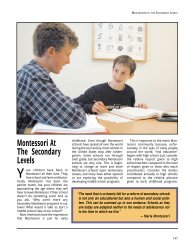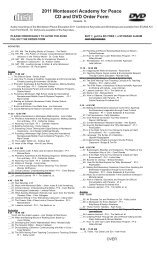Tim Seldin & Paul Epstein Ph.D. An Education for Life
Tim Seldin & Paul Epstein Ph.D. An Education for Life
Tim Seldin & Paul Epstein Ph.D. An Education for Life
Create successful ePaper yourself
Turn your PDF publications into a flip-book with our unique Google optimized e-Paper software.
and poorly used to pressure teachers<br />
and students to per<strong>for</strong>m at higher<br />
standards. Although standardized tests<br />
may not offer a terribly accurate measure<br />
of a child’s basic skills and knowledge,<br />
in most countries test-taking<br />
skills are just another Practical <strong>Life</strong><br />
lesson that children need to master.<br />
How Do Montessori Schools<br />
Report Student Progress?<br />
Because Montessori believes in individually<br />
paced academic progress,<br />
most schools do not assign letter<br />
grades or rank students within each<br />
class according to their achievement.<br />
Student progress, however, is measured<br />
in different ways, which may<br />
include:<br />
Student Self-Evaluations: At the elementary<br />
level, students will often prepare<br />
a monthly self-evaluation of the<br />
past three month’s work: what they<br />
accomplished, what they enjoyed<br />
the most, what they found most<br />
difficult, and what they would like to<br />
learn in the three months ahead.<br />
When completed, they will meet with<br />
the teachers, who will review it<br />
and add their comments and observations.<br />
Portfolios of Student Work: In many<br />
Montessori schools, two or three<br />
times a year, teachers (and at the elementary<br />
level, students) and parents<br />
go through the students’ completed<br />
work and make selections <strong>for</strong> their<br />
portfolios.<br />
Student/Parent/Teacher Conferences:<br />
Once the students’ three-month selfevaluations<br />
are complete, parents, students,<br />
and teachers will hold a family<br />
conference two or three times a year<br />
to review their children’s portfolios<br />
and self-evaluations and go through<br />
the teachers’ assessment of their children’s<br />
progress.<br />
Narrative Progress Reports: In many<br />
Montessori schools, once or twice a<br />
year, teachers prepare a written narrative<br />
report discussing each student’s<br />
work, social development, and mastery<br />
of fundamental skills.<br />
Will My Child Be Able to Adjust to<br />
Traditional Public or Private Schools<br />
After Montessori?<br />
By the end of age five, Montessori children<br />
are normally curious, self-confident<br />
learners who look <strong>for</strong>ward to going<br />
to school. They are normally engaged,<br />
enthusiastic learners who honestly want<br />
to learn and who ask excellent questions.<br />
Montessori children by age six have<br />
spent three or four years in a school<br />
where they were treated with honesty<br />
and respect. While there were clear<br />
expectations and ground rules, within<br />
that framework, their opinions and<br />
questions were taken quite seriously.<br />
Un<strong>for</strong>tunately, there are still some<br />
teachers and schools where children<br />
who ask questions are seen as challenging<br />
authority.<br />
It is not hard to imagine an independent<br />
Montessori child asking his new<br />
teacher, “But why do I have to ask each<br />
time I need to use the bathroom?” or,<br />
“Why do I have to stop my work right<br />
now?” We also have to remember that<br />
children are different. One child may be<br />
very sensitive or have special needs that<br />
might not be met well in a teacher-centered<br />
traditional classroom. Other children<br />
can succeed in any type of school.<br />
There is nothing inherent in Montessori<br />
that causes children to have a hard<br />
time if they are transferred to traditional<br />
schools. Some will be bored. Others<br />
may not understand why everyone in<br />
the class has to do the same thing at the<br />
same time. But most adapt to their new<br />
setting fairly quickly, making new<br />
friends, and succeeding within the definition<br />
of success understood in their<br />
new school.<br />
PARENTS’ QUESTIONS &ANSWERS<br />
There will naturally be trade-offs if<br />
a Montessori child transfers to a traditional<br />
school. The curriculum in<br />
Montessori schools is often more<br />
enriched than that taught in other<br />
schools in the United States. The values<br />
and attitudes of the children and<br />
teachers may also be quite different.<br />
Learning will often be focused more<br />
on adult-assigned tasks done more<br />
by rote than with enthusiasm and<br />
understanding.<br />
There is an old saying that if something<br />
is working, don’t fix it. This<br />
leads many families to continue their<br />
children in Montessori at least<br />
through the sixth grade. As more<br />
Montessori High Schools are opened<br />
in the United States and abroad, it is<br />
likely that this trend will continue.<br />
Is Montessori Opposed to<br />
Competition?<br />
Montessori is not opposed to competition;<br />
Dr. Montessori simply<br />
observed that competition is an ineffective<br />
tool to motivate children to<br />
learn and to work hard in school.<br />
Traditionally, schools challenge students<br />
to compete with one another<br />
<strong>for</strong> grades, class rankings, and special<br />
awards. For example, in many<br />
schools tests are graded on a curve<br />
and are measured against the per<strong>for</strong>mance<br />
of their classmates rather<br />
than considered <strong>for</strong> their individual<br />
progress.<br />
In Montessori schools, students<br />
learn to collaborate with each other<br />
rather than mindlessly compete.<br />
Students discover their own innate<br />
abilities and develop a strong sense<br />
of independence, self-confidence,<br />
and self-discipline. In an atmosphere<br />
in which children learn at their own<br />
pace and compete only against themselves,<br />
they learn not to be afraid of<br />
making mistakes. They quickly find<br />
that few things in life come easily,<br />
and they can try again without fear of<br />
233




